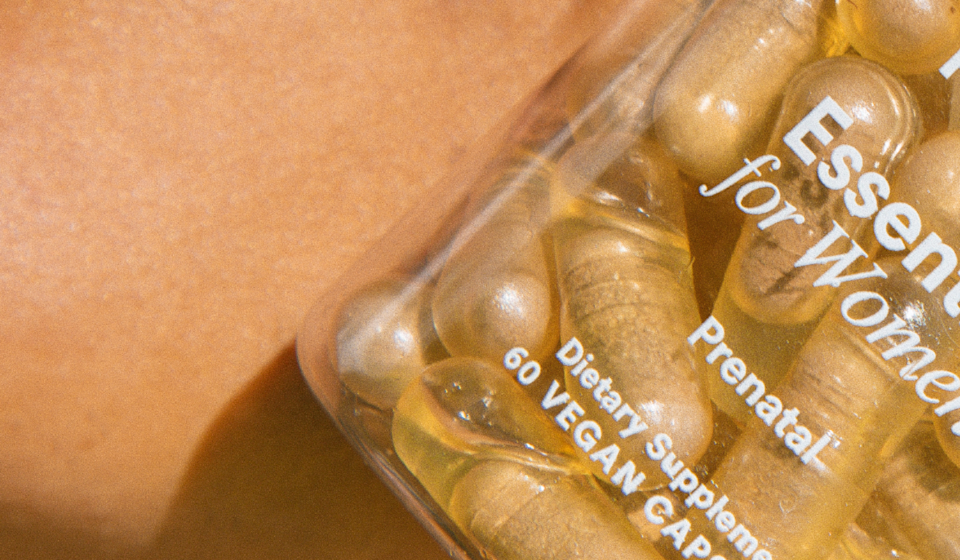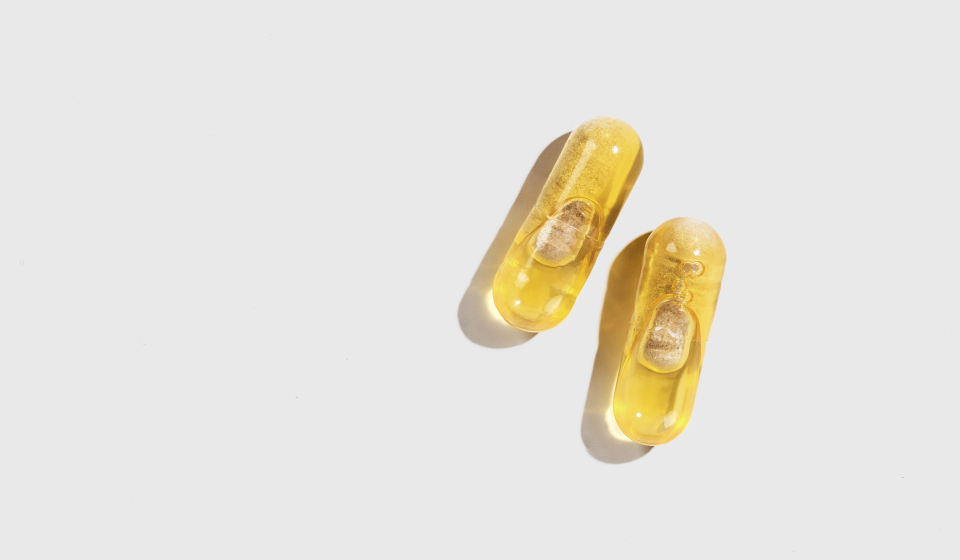According to the American Society for Reproductive Medicine (ASRM), people who are trying to get pregnant can prioritize consuming:
• Folate (e.g., dark and leafy greens, beans, folic acid-fortified grains and cereals)
• Antioxidant rich foods such as strawberries, blueberries, dark chocolate, and spinach
• Long-chain omega-3 fatty acids (e.g., salmon, tuna, mackerel)
• Soy isoflavones (e.g., tofu, soybeans, edamame)
• Full-fat dairy
• Whole grains
• Vegetables
• Fish
The reality is that paying such close attention to what nutrients you’re consuming can be stressful. This is where starting a prenatal multivitamin early comes into play: It’s never too early to start taking a prenatal. We recommend taking a prenatal at least 3 months before pregnancy.*
Ingredients to Look For During Pregnancy
Before we go on: With all of these recommendations, cut yourself some slack. No one’s perfect, and no one’s going to be able to follow all of these suggestions to a T. All we can do is try our best.
How are you supposed to even decide what’s good and what’s not? In an interview with The Skinny Confidential, our Founder & CEO, explained when it comes to a supplement “...as a consumer, you have to think of safety and efficacy, is this going to help me or hurt me? And really make sure the products you take have third-party testing. [It’s] a very good validator that the company is not just saying that they’re third-party tested but there’s another company that’s validating those third-party results.”
BTW: Essential Prenatal is third-party tested for heavy metals for mom and baby’s safety during preconception and pregnancy.*
Let’s start with the vitamins and minerals ACOG highlights as essential during pregnancy that you can also find in our Essential Prenatal Multivitamin*:
• Iron contributes to red-blood cell formation and energy-yield metabolism. Pregnant women also have the highest demand for iron.*
• Iodine helps support skeletal and central nervous system development.* During early pregnancy, the fetus depends on maternal iodine intake.*
• Choline is a building block for cell membranes and a key nutrient that supports the development of baby’s neural tube.*
• Vitamin D to help maintain bone health and to support infant dental health.* Vitamin D is important during the preconception period.*
• Vitamin B12 to support normal DNA synthesis.*
• Folate, contributes to maternal tissue during pregnancy and supports the fetus’ brain and neural tube development.*
Getting every single recommended vitamin and mineral isn’t always easy—especially for vegetarians or people who live in areas where certain foods are in low supply. Prenatal multivitamins like our Essential Prenatal Multivitamin can help build up levels of important key nutrients before and during pregnancy—including folate and iron.*
Ingredients to Avoid During Pregnancy
Experts spanning pregnancy, nutrition, and environmental health have set important standards for what food to avoid during pregnancy to support you and your growing baby.
Foods
Reading food labels is really important during pregnancy. Some ingredients and foods can lead to consumption of high levels of mercury, for example. The following recommendations can help you steer clear. (3)
Limit consuming:
• More than 6oz of white albacore tuna a week.
• More than 200mg of caffeine in a day.
Avoid consuming:
• Trans fatty acids (e.g., store-bought baked goods, fried foods)
• High glycemic load (e.g., raisins, brown rice, couscous)
• Processed meats like hot dogs and deli meats.
• Carbohydrates
• Raw fish.
• Fish with high levels of mercury, like bigeye tuna, king mackerel, swordfish, marlin, orange roughy, or tilefish (cooked or shelf-stable are okay).
• Raw or undercooked eggs or foods made with raw or undercooked eggs (e.g., soft-scrambled eggs, cake batter, raw cookie dough, non-shelf-stable Caesar salad dressings, eggnog, hollandaise).
• Unpasteurized juice, milk, soft cheese, or foods made with unpasteurized juice, milk, or soft cheese.
• Raw sprouts.
• Unwashed fruits and vegetables.
• Store-bought salads (e.g., chicken salad, egg salad, tuna salad).
• Most herbal pills and teas.
• Alcohol
Cooking and Storing Food
Even the items we use to cook or store our food are important to keep an eye on. The items many of us touch on a near-daily basis can contain toxins for pregnant people and growing babies.
Although these toxins are pretty impossible to avoid, here are some ways to reduce your exposure (7):
• Avoid using plastic water bottles or food storage containers (bisphenols like BPA).
• Avoid using nonstick cookware, frozen and delivery food packaging, and unfiltered water (PFAS aka “forever chemicals”).
• Avoid using spot removers, degreasing products, and dry cleaning (PERC and TCE).
• Don’t put unwashed hands in your mouth (lead and flame retardants).











